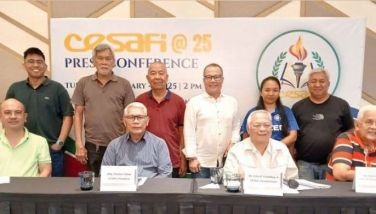Match-up

It does seem, with each passing day, the 2022 presidential elections will be a match-up between Vice-President Leni Robredo and Davao City mayor Sara Duterte. The former is playing coy about her plans; the latter has adamantly rejected the idea of running for the highest post.
Early this week, a group announced the formation of Duterte Pa Rin, a civil society network urging Sara to succeed her father. The group desires a continuation of the policies and the strong-willed leadership associated with the presidency of Rodrigo Duterte.
On the other side of the fence, the self-appointed nominating group 1Sambayan announced their nominees would be made public on June 12. The list of nominees will be for the full slate of national-level candidates: president, vice-president and 12 senators.
Although elections are scheduled for May next year, the deadline for filing certificates of candidacies is advanced to October to enable printing of ballots to suit the requirements of automated election counting. In the automated system we use, ballots are tailor-made for each locality, listing both national and local candidates.
The advanced deadline for filing puts pressure on potential candidates to announce earlier than they might prefer. They are likewise under pressure to set up nationwide campaign organizations early, magnifying costs.
Early ascertainment of candidacies increases the likelihood of larger pre-campaign spending. Under our election laws, candidate spending before the actual election period is not considered covered by limits on electoral spending. We have seen in the last few elections a tendency for candidates to spend extravagantly on pre-campaign advertising to build name-recall, define the issues for voters to decide on and win over undecided voters. The actual campaign period passes nearly as mere formality.
Only the US has a longer campaign period. This is because of the primaries process by which party nominees are decided. Candidates for the presidency normally spend two years on the road, first to win the party primaries and then the actual elections.
The rise this year of civil society coalitions such as Duterte Pa Rin and 1Sambayan further erode the role played by conventional political parties. The political party system, in theory, defines the constituencies, provide pathways for rising political leaders and mobilize resources for the electoral battle.
A strong political party system likewise defines the range of potential electoral outcomes, bringing a bit of certainty to the exercise. Strong parties make serving at an elective post a career. The party system filters out the charlatans and carpetbaggers. In our case, formal party affiliation is little more than a convenience to meet filing requirements and the accounting of campaign expenses.
We are where we are, for better or for worse. The actual electoral alliances are ad hoc and existing parties have lesser roles to play.
Nominally, we have a multiparty system. In actuality we have a no-party system. This goes against the inherent bi-factional dynamic of local political contestation, forcing down-ticket candidates to shift allegiances as coalitions at the national level form.
This weakens the hold formal parties have on the candidates they field. This enables the parties to escape accountability if their politicians are called out for scandalous behavior.
With the diminished role played by formal political parties, the role of informal (and concealed) power brokers becomes more decisive. The candidates are not bound to a party program or set of principles. No lasting party constituencies are formed. Electoral politics becomes all the more personality-centered. There is no means for ensuring policy continuity after each electoral cycle.
We saw in the tragic “Otso Diretso” debacle in 2019 the hazards of ad hoc political formations. The opposition senatorial slate was unable to reassemble the old Liberal Party-led coalition, much of which defected to the pro-Duterte supermajority.
Without the backbone of a political party coalition, the ad hoc “Otso Diretso” could not inspire bloc voting among supporters of individual candidates. Without a core of reliable bloc voting electors, the line-up of disparate candidates was doomed.
By contrast, the pro-Duterte senatorial slate enjoyed a bloc voting base of support mustered by the coalition’s component political parties. This delivered the surprising victories of electoral first-timers like Bong Go and Bato de la Rosa.
It is nearly certain the 1Sambayan will choose a line-up of candidates associated (but not necessarily affiliated) with the Liberal Party led by Leni Robredo. But the Liberal Party is clearly not in control of the candidate selection process. It fact, it has signaled it could undertake a selection process distinct from the 1Sambayan selection exercise. We could yet end up with the LP and the 1Sambayan fielding overlapping but separate slates, confusing the voters and denying the opposition a clear rallying point.
Robredo recently emphasized that the opposition (whatever affirmatively defines it) needs to have a single candidate for president if it is to win the electoral battle. We need convincing that 1Sambayan is the vehicle to ensure that.
The Vice President herself has been studying (on her own) the possibility of sliding down and seeking a local post, possibly governor of Camarines Sur. She is probably doing this to delay the decision point because she is certainly disqualified from seeking the provincial governorship for failing to meet residency requirements.
All other parties apart from the LP appear to be (so far) affiliated with the pro-Duterte coalition. This opens the way for many local contests where the rival candidates uniformly swear allegiance to the pro-Duterte national candidates.
There were many localities where this happened in 2019. Where the phenomenon happened, the opposition bets for national elective positions were crowded out.
- Latest
- Trending
























